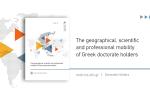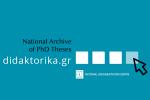
Interesting data on PhD holders graduating from Greek universities, and especially those who received a doctorate in 2019, are included in the new publication 'Statistics on doctorate holders who graduated from Greek universities in 2019' by the National Documentation Centre (EKT).The publication presents statistical data (distribution of ISCED8 graduates per institution & department, region, dissertation’s field of science, duration of study, international mobility, previous degrees, etc.) on those who completed their dissertation in Greek universities and were awarded doctorates in 2019.
The publication also presents trends and fluctuations of selected indicators for the period 2016-2019, as well as combined indicators for the distribution of new PhDs by gender and age group, by gender and scientific field of specialisation, duration of doctoral studies and source of funding for their studies, etc.
As part of the statistics on Research, Technology, Development and Innovation (RDI), annual national statistics on doctoral degree holders of Greek universities are produced by EKT as National Authority of the Hellenic Statistical System. To ensure comprehensive coverage of this population group, the statistics are based on primary data that are completed by the PhD holders themselves upon receiving their doctoral degree. Data collection is made in parallel with the inclusion of their doctoral dissertation in the National Archive of PhD Theses, which was created and has operated since 1985, according to the relevant law. With more than 45,000 doctoral dissertations, which are available electronically, the National Archive of PhD Theses (https://phdtheses.ekt.gr) is a unique repository of Greek scientific output and knowledge featuring cutting-edge research.
In 2019, 1,685 new doctorates were awarded by Greek universities. Regarding the distribution of the new doctorates awarded by Greek universities in 2019, most of dissertations were completed at the National and Kapodistrian University of Athens and the Aristotle University of Thessaloniki with 26.2% and 18.7%, respectively. They were followed by the National Technical University of Athens, the University of Patras, and the University of Crete (percentages of 6.1 -8.0)
As for distribution of new doctorate holders per region of the country, most received their doctorate from institutions in the Attica Region, followed by the Regions of Central Macedonia, Western Greece, Crete, Epirus and Thessaly.
In terms of gender distribution of new doctorate holders, women outnumbered men in 2019, for the first time since 2015, by 52.3%, compared to 47.7%. Most dissertations were relevant to Medicine and Health Sciences (28.5%), followed by Natural Sciences (24.6%) and Social Sciences (22.4%). There were lower percentages for Engineering and Technology Sciences (16.1%), Humanities (13.5%) and Agricultural Sciences (2.9%).
Regarding the distribution of 2019 PhD holders per sex and scientific field, data show that women were predominant in the fields of Social Sciences, Humanities, as well as Medicine and Health Sciences (59.6%, 56.5% and 56.2%, respectively). Men excelled in the fields of Engineering and Technology, Agricultural Sciences, and Natural Sciences (61.1%, 52.8% and 50.7%, respectively)
In 2019, the majority of PhD holders completed their dissertation in 5 years (23.3%) with others taking 4, 6 and 10 years or over (15.6%, 13.2% and 12.7%, respectively). A percentage of 6.5 of the doctorate holders who completed their dissertation in a period of 3 years was also recorded.
The distribution of new PhD holders by source of funding and duration of completion of doctoral studies is recorded in the combined indicators included in the new EKT publication. In the case of those who completed their studies in 3 years, as well as in 4-5 years, a scholarship from a Greek institution was the main source of funding. In the other duration groupings (6-9 years and 10 years and over), the longer the duration of the dissertation, the greater the importance of personal savings and family support, at the same time that the percentage of funding from an institutional scholarship decreased.
As far as the international mobility of doctorate holders is concerned, it appears that 275 people (less than 20% of new PhD holders) stayed abroad during their doctoral studies for reasons other than tourism. The most popular country was the United Kingdom (22.9%). According to the responses of those who stated that they stayed abroad during the preparation of their doctoral dissertation, 63.6% settled abroad as part of their doctorate / research, 19.0% moved for professional reasons (or for employment reasons, or for job search), while 7.8% for family / personal reasons.
Time data and trends for Greek doctorate holders
Based on the evolution over time of selected indicators for the period 2016-2019, it is worth noting that the predominance of men in previous years changed for the first time in 2019, as already mentioned.
It is also interesting that for most PhD holders, the main source of funding for their doctoral studies in the period 2016-2019 was consistently personal savings and family support. However, for 2019 graduates, receiving a scholarship from a Greek institution was particularly important.
Finally, as shown by the data on the Greek doctoral graduates for the period 2016-2019, the National and Kapodistrian University of Athens and the Aristotle University of Thessaloniki are the universities awarding the most PhDs, followed by the National Technical University of Athens and the University of Patras. In terms of the age of new doctorate holders, most belong steadily to the age group of up to 35 years, followed by the next age group of 35 to 44 years.
Regarding the scientific specialisation of the new doctorate holders from Greek universities –according to the 6 main scientific fields of the Frascati classification- most of the dissertations during the period 2016-2019 were relevant to Medicine and Health Sciences, followed by Natural Sciences, Social Sciences and Engineering and Technology.















